In Thailand, journalist Chutima Sidasathian has called on her government to celebrate World Press Freedom Day by dropping the case against her. She and her colleague Alan Morison were charged with criminal defamation after publishing a story on Phuketwan.com linking the Thai Navy to the trafficking of the Rohynga boat people. Following their April 17 court appearance, Morison described the Navy's tactics as ''A battle fought in court to silence the voices of democracy.''
In this blog, their friend and fellow writer Lana Willocks retraces the most recent developments in their case and examines the bigger picture of how Thailand's defamation laws and the Computer Crimes Act are threatening press freedom.
Phuketwan Journalists face criminal defamation charges in Thailand
THE ISLAND of Phuket, in Southern Thailand, is well known for its neon-lit nightlife, regattas and luxury resorts, but the recent prosecution of two journalists at a small English-language website has also brought into focus a more complex political reality that lies beyond the white-sand beaches and other tourist diversions.
On April 17, the Australian journalist Alan Morison and his Thai colleague Chutima Sidasathian, publishers of the local news site Phuketwan, appeared in court to answer charges of criminal defamation because they had cited a Reuters report on the mistreatment of Rohingya migrants.
Posted on July 17, 2013, the Phuketwan article republished Reuters' claims that Thai military personnel were complicit in human trafficking of the Rohingya, a Muslim minority fleeing violence and persecution in Burma.
The officer who initiated the defamation charges on behalf of the Thai Royal Navy identified a specific paragraph in the Reuters report - one that Phuketwan had reproduced in its entirety - as defamatory. The case is said to be the first instance of the Thai military bringing such charges against local journalists.
The Phuket court has agreed to hear the case and Morison and Chutima, who were released after a local rights group posted bail of 200,000 baht ($6000 CAD), are scheduled to return for a hearing on May 26.
If convicted, they face severe penalties. Criminal defamation carries a sentence of up to two years and the pair also face a separate charge of violating the Computer Crimes Act - an offence punishable by five years in prison and fines of up to 100,000 baht.
Reuters wins Pulitzer Prize for Rohingya series
Two days before the Phuketwan journalists appeared in court, Reuters reporters Andrew RC Marshall and Jason Szep were awarded a Pulitzer Prize for international reporting for an investigative series. The series included the expose of Rohingya trafficking that had been cited by Phuketwan.
While Reuters celebrated, however, the Phuketwan journalists found themselves enduring several hours' detention in overcrowded cells for having published the very same words. Morison and Chutima expressed disappointment that no one at Reuters has offered support even though Chutima worked as a local fixer for the Reuters journalists who were awarded the prize.
Morison, 66, is a veteran newspaper and broadcast journalist. He worked for The Age and other Australian dailies, and for CNN in Hong Kong before moving to Phuket 12 years ago. Chutima, 33, holds a law degree and is a PhD candidate in Asian Studies at Walailak University.
Phuketwan's reporting on the Rohingya boat people has won praise and international recognition, including awards from the Society of Publishers in Asia, the Hong Kong News Awards and the Human Rights Press Awards.
To date there has been no official explanation as to why the court is proceeding with the case against Phuketwan but not pursuing similar charges against Reuters or other publications that republished its claims.
The navy officer who launched the suit against Phuketwan also filed a criminal complaint against Reuters, Szep, and Stuart Grudgings (another Reuters journalist), for violating the Computer Crimes Act. The complaint is said to be under review.
Computer Crimes Act - a threat to press freedom in Thailand
The Phuketwan case has sparked fear among local journalists and within agencies that republish international news feeds. Morison and Chutima have made it clear that they do not believe they have done anything wrong and are prepared to risk going to jail.
In an April 16 interview Morison told Radio Australia, ''It's a trumped up charge . . . designed to put Phuketwan out of business. For seven years we've been exposing what's been happening off Thailand and inside Thailand for the Rohingya boat people who come down looking for sanctuary and find themselves in the arms of human traffickers. They are treated appallingly at every level.''
After Phuketwan learned of the charges in late December 2013 the Navy's actions have been widely condemned by local and international human rights and freedom of speech groups, including the UN Office of the High Commissioner for Human Rights.
Since its introduction in 2007, following the ouster of Thaksin Shinawatra, the Computer Crimes Act has been widely criticised by local rights groups for exerting a chill on freedom of expression and creating a culture of self-censorship. Criminal defamation has repeatedly been cited as a rising threat to free speech.
A Fairfax media report noted that some 1600 cases were filed in 2013 alone, and 96 percent of those that proceeded to trial resulted in convictions.
Although Phuketwan has received legal aid from local and international groups, the time and energy needed to answer the legal charges has consumed much of the team's limited resources and hampered its ability to report on the Rohingya and other regional news.
The Rohingya struggle has intensified over the past few years. Following violent confrontations with Rakhine Buddhists in western Burma, the Rohingya have been fleeing the country in greater numbers. Reports indicate that at least 237 have been killed in religious violence since June 2012 and more than 140,000 have been displaced.
Rohingya refugees who are trafficked through Thailand are usually trying to reach Malaysia, where they can more easily find work and settle peacefully among the predominantly Muslim population. Instead, they often fall prey to human traffickers who beat and torture them, and extort money from their families while they are smuggled along the Andaman coast.
The day after her indictment, Chutima said, ''I feel more strong and more calm. I'm not scared because I believe I'm doing the right thing. Yesterday I had many feelings . . . deep pain yet I was happy as well to know that the Rohingya issue has now become international news. We'll keep trying to do our best and will continue covering the Rohingya story.''
Phuketwan is marking the 30-day countdown to the 30th anniversary of the World Media Freedom Day on May 3 with news outlets around the world. The Royal Thai Navy has yet to accept an offer to explain its approach to media freedom and the Rohingya boatpeople in Phuketwan.
Lana Willocks is a freelance writer and editor from Blackie, Alberta. She made her first visit to Thailand on a 1995 exchange program with the University of Victoria, where she earned a degree in international business. She's been living in Phuket since 1999.

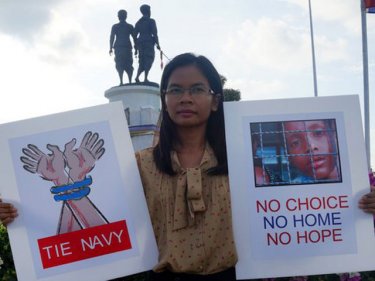




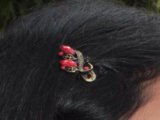
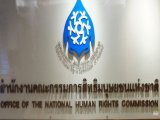
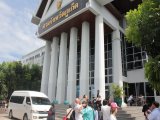



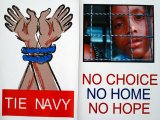




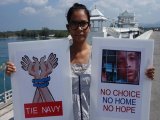
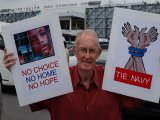


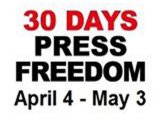
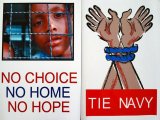

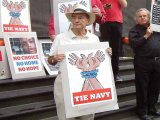

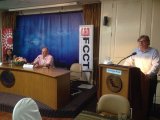
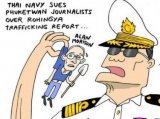



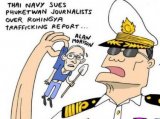
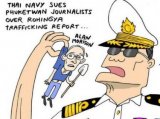
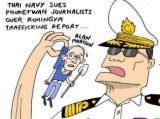
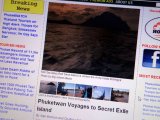




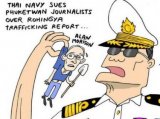
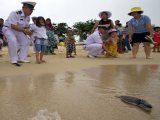

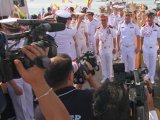




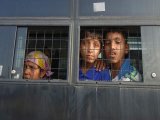

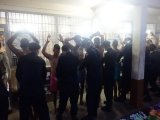


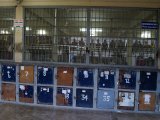
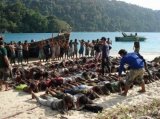
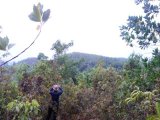



I have refused to go to Fiji while it was under anti-democratic rule and know others who, like me, would never have gone to South Africa in the old days. It would be a shame if Thailand's opposition to the right of free speech - a vital component of democracy - started costing your beautiful country millions of dollars in lost tourist revenue. It's as if the Royal Thai Navy was in a small boat approaching a waterfall drop, and refuses to see the danger immediately ahead.
Posted by Ken Haley on April 28, 2014 13:18